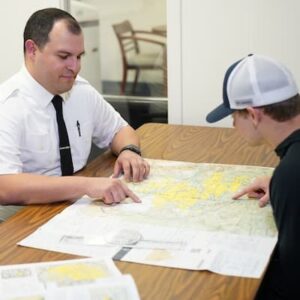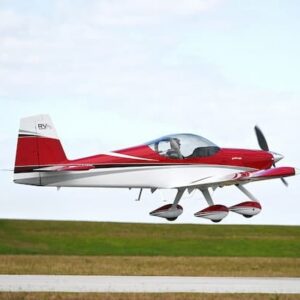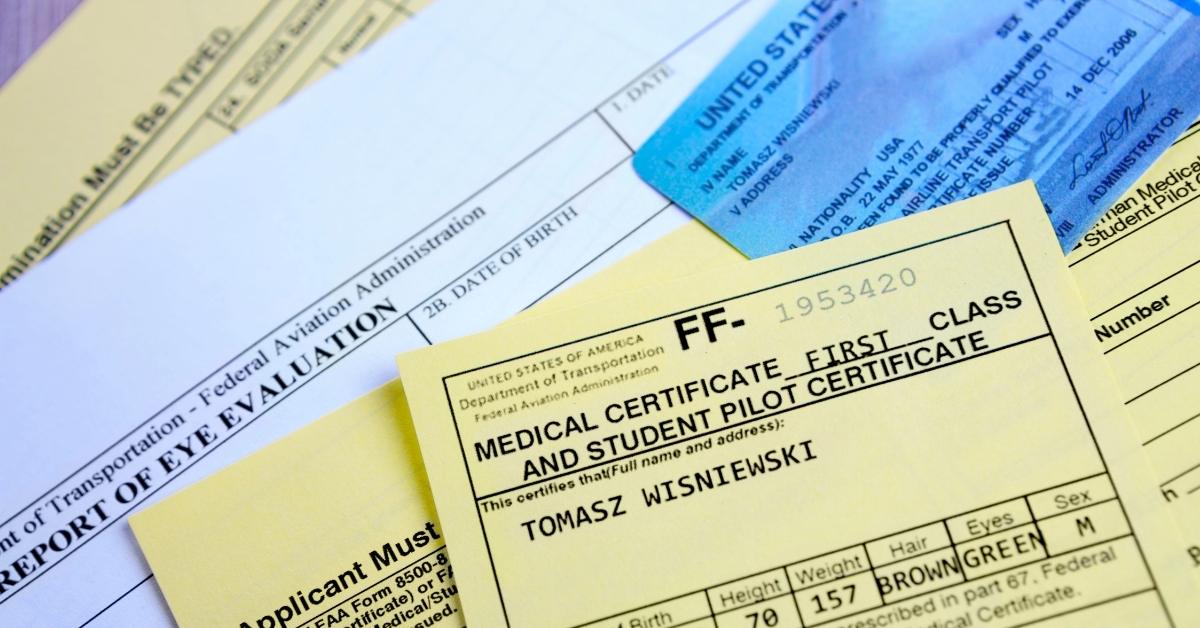Before taking the controls of an aircraft as a student pilot, you’ll need the appropriate medical certificate. There are three different classes of medical certification: First, Second, and Third. It’s important to understand which one aligns with your aviation goals.
Whether you’re training for personal enjoyment or training for a career as a commercial or airline pilot, the required medical certification will vary. Here’s a breakdown of each class, including its purpose, duration, and eligibility requirements.
Three Classes of FAA Medical Certification Explained
First-Class Medical Certificate
Who needs it: Airline Transport Pilots (ATP)
If your goal is to fly for a commercial airline, you’ll need a First-Class Medical Certificate. This is the highest level of medical certification and is required for pilots serving as the pilot-in-command (PIC) of an airline transport flight.
Key Details:
- Valid for 12 months if you’re under 40.
- Valid for 6 months if you’re 40 or older (for ATP privileges).
- Requires the most comprehensive medical exam, including vision, hearing, cardiovascular health, neurological evaluation, and possible ECG for certain age brackets.
Why it matters: Even student pilots on the airline career path often begin with a First-Class exam to ensure they’re medically fit for long-term career goals.
To exercise student pilot, private pilot, or flight instructor privileges, a first-class medical certificate will remain valid for 60 calendar months if the holder is under 40 and 24 calendar months if the holder is over 40.
Second-Class Medical Certificate
Who needs it: Commercial Pilots (non-airline)
This certificate is required for pilots who are compensated to fly, such as charter, corporate, or aerial survey pilots, and ATPs acting as second-in-command.
Key Details:
- Valid for 12 months for all ages when exercising commercial privileges.
- Exam requirements are similar to First-Class, but typically do not require an ECG unless there’s a medical indication.
Why it matters: If you’re planning to fly professionally but not for an airline (e.g., cargo, sightseeing tours, banner towing), a Second-Class Medical Certificate is your go-to requirement.
Third-Class Medical Certificate
Who needs it: Private Pilots and most student pilots
This is the minimum medical certification required for most general aviation activities and recreational flying.
Key Details:
- Valid for 60 months (5 years) if you’re under 40.
- Valid for 24 months (2 years) if you’re 40 or older.
- The medical exam is less intensive than First- or Second-Class, but still includes vision, hearing, blood pressure, and a review of your overall health history.
Why it matters: If you’re pursuing a Private Pilot Certificate or flying for pleasure, this is the medical certification you’ll need. Certified flight instructors are required to hold at least a Third-class medical certificate.
What About BasicMed?
For certain non-commercial operations, pilots may be eligible to fly under BasicMed rather than maintaining a Third-Class Medical. BasicMed is an alternative certification that allows eligible pilots to operate under specific limitations without an FAA medical exam.
BasicMed Requirements:
- Must have previously held a valid FAA medical certificate after July 14, 2006.
- Must complete a medical exam with a state-licensed physician every 48 months.
- Must complete an FAA-approved BasicMed online course every 24 months.
- Limited to aircraft under 6,000 lbs and carrying no more than five passengers (plus the pilot).
- Operations are limited to within the U.S., at less than 18,000 feet MSL and below 250 knots.
Who uses it: Experienced pilots flying strictly for personal use and meet all BasicMed criteria.
How to Get a Medical Certificate
Medical exams must be performed by an FAA-designated Aviation Medical Examiner (AME). You can find one near you through the FAA’s website. Before your appointment, complete the MedXPress application online to streamline the process.
Tip: If you’re unsure which certificate you need, speak with a flight school like American Flyers before scheduling your exam. Choosing the right certification from the start can help prevent delays in your training or career progression.
Check out this article on How To Fill Out A Medical Form
Plan Ahead for Your Aviation Goals
The medical certificate you need depends entirely on your goals as a pilot. While a Third-Class certificate may be sufficient for private flying, a First- or Second-Class certificate may be required sooner than you think if your aspirations include paid flying or an airline career.
At American Flyers, we guide students from their first medical exam through certification and beyond. Whether you’re flying for fun or preparing for a professional career, understanding your medical certification needs is the first step toward achieving your goals.














